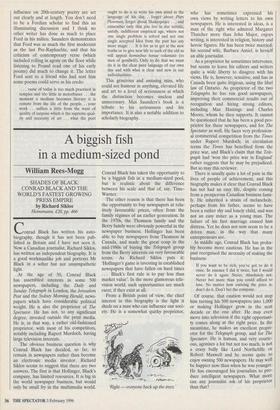A biggish fish in a medium-sized pond
William Rees-Mogg
SHADES OF BLACK: CONRAD BLACK AND THE WORLD'S FASTEST GROWING PRESS EMPIRE by Richard Siklos Heinemann, £20, pp. 466 Conrad Black has written his auto- biography, though it has not been pub- lished in Britain and I have not seen it. Now a Canadian journalist, Richard Siklos, has written an independent biography. It is a good workmanlike job and portrays Mr Black in a sober but not unsympathetic light.
At the age of 50, Conrad Black has assembled interests in some 500 newspapers, including the Daily and Sunday Telegraph in London, the Jerusalem Post and the Sydney Morning Herald, news- papers which have considerable political weight. He is also the proprietor of The Spectator. He has not, to any significant degree, invested outside the print media. He is, in that way, a rather old-fashioned proprietor, with most of his competitors, notably including Rupert Murdoch, having large television interests.
The obvious business question is why Conrad Black has decided, so far, to remain in newspapers rather than become an electronic media investor. Richard Siklos seems to suggest that there are two answers. The first is that Hollinger, Black's company, has limited resources. It is big in the world newspaper business, but would only be small fry in the multimedia world. Conrad Black has taken the opportunity to be a biggish fish in a medium-sized pool, but is realistic about the difference between his scale and that of, say, Time- Warner.
The other reason is that there has been the opportunity to buy newspapers at rela- tively favourable prices, often from the family regimes of an earlier generation. In the 1970s, the Thomson family and the Berry family were obviously powerful in the newspaper business. Hollinger has been able to buy newspapers from Thomson in Canada, and made the great coup in the mid-1980s of buying the Telegraph group from the Berry interests on very favourable terms. As Richard Siklos puts it: 'Hollinger's game is investing in established newspapers that have fallen on hard times . . . Black's first rule is to pay less than market value'. In the more glamorous tele- vision world, such opportunities are much rarer, if they exist at all.
From a British point of view, the chief interest in this biography is the light it sheds on a man who can influence our soci- ety. He is a somewhat quirky proprietor, 'Right — everyone back up the trees.' who has sometimes expressed his own views by writing letters to his own newspapers. He is interested in ideas, is a man of the right who admired Margaret Thatcher more than John Major, enjoys writing, is interested in religion, history and heroic figures. He has been twice married; his second wife, Barbara Amiel, is herself an able journalist.
As a proprietor he sometimes intervenes, but seems to leave his editors and writers quite a wide liberty to disagree with his views. He is, however, sensitive, and has in Canada been quite litigious, using the libel law of Ontario. As proprietor of the two Telegraphs he has run good newspapers, improving their commercial results out of recognition and hiring strong editors, including Max Hastings and Charles Moore, whom he then supports. It cannot be questioned that he has been a good pro- prietor for these newspapers, and for The Spectator as well. He faces very profession- al commercial competition from the Times under Rupert Murdoch; in circulation terms the Times has benefited from the price war, and Black's claim that the Tele- graph had 'won the price war in England' rather suggests that he may be prejudiced. But so may this reviewer.
There is usually quite a lot of pain in the lives of people of achievement, and this biography makes it clear that Conrad Black has not had an easy life, despite coming from a prosperous Canadian business fami- ly. He inherited a strain of melancholy, perhaps from his father, seems to have been a rather shy and lonely child, and was not an easy mixer as a young man. The failure of his first marriage caused him distress. Yet he does not now seem to be a driven man, in the way that many entrepreneurs are.
In middle age, Conrad Black has proba- bly become more cautious. He has in the past recognised the necessity of staking the business: If you want to be rich, you've got to do it once. In essence I did it twice, but I would never do it again. Never. Absolutely not. Never bet more than you could afford to lose. No matter how enticing the price is, don't do it. Don't bet the company.
Of course, that caution would not stop him turning his 500 newspapers into 1,000 or making Hollinger grow in the next decade or the one after. He may even move into television if the right opportuni- ty comes along at the right price. In the meantime, he makes an excellent propri- etor for the Telegraph group, and for The Spectator. He is human, and very courte- ous, agonises a lot but not too much, is not a crazy bully like Lord Northcliffe or Robert Maxwell and he seems quite to enjoy owning 500 newspapers. He may well be happier now than when he was younger. He has encouraged his journalists to pro- duce intelligent newspapers. What more can any journalist ask of his proprietor than that?


































































 Previous page
Previous page